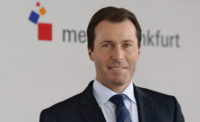pme recently interviewed McWane Plumbing Group Executive Vice President Kurt Winter and AB&I Foundry General Manager and Vice President of Sales Michael Lowe at the AB&I facility in Oakland, Calif. Along with AB&I, companies in the McWane Plumbing Group are: Tyler Pipe & Coupling: Anaco, which includes the Husky brand; Wade Drains; and Bibby Ste. Croix.
Before being promoted to his current position July 1, Winter served as McWane Plumbing Group vice president and AB&I general manager. Lowe, also promoted July 1, had been AB&I’s vice president of sales.
pme: What is the primary common denominator AB&I shares with other companies in the McWane Plumbing Group?
KW: The most visceral common denominators a team member in every McWane facility eats, sleeps, and drinks are safety and environmental awareness.
ML: All our companies’ products relate to DWV – drain, waste and vent. Tyler Pipe makes cast-iron soil pipe fittings, as we do. Anaco/Husky and Tyler Couplings are the joining systems. Wade Drains is the drain system, and Bibby is a cast-iron soil pipe manufacturer in Canada.
Another common denominator is we have personal relationships in the plumbing distribution channel with engineers, inspectors, distributors and contractors. We try to get out in the field to create a personal rapport. For me, that means being very visible. It means being responsible and giving back to our industry in terms of the time and energy we spend working on codes and standards. Some of these efforts have very little to do with our product, but we try to be very good stewards toward the industry that we participate in. We are bringing in a new generation of people to do that. The other thing is we have a common leader in Kurt.
pme: Why is it important for plumbing engineers, contractors and distributors to support companies manufacturing products in the United States?
ML: It’s jobs, certainly. Not only the direct jobs that support the economy of our manufacturing plants and our manufacturers reps but also all the related jobs of our customers. There’s a multiplier effect for our customers and vendors’ jobs of four or five to one that we generate for the economy. The other factor is quality. Although you can manufacture quality products anywhere, and China can make good products, they often make products that don’t pass muster. In the United States, you have a higher quality assurance that it’s going to be done right. That’s not to say the industry is prohibitive toward imported products. It’s just that in the U.S., we have regulators of quality and the scrutiny is much greater. In other countries, it’s hit and miss.
pme: Why does AB&I invest so heavily in its environmental programs?
ML: Environmental stewardship is one of our core beliefs. As a foundry in California, we are held to a much higher standard than anyone else in the world, and we exceed that in a good way.
When we talk about the environment, we have to meet the national standards of EPA and OSHA. The next level up for regulations is California’s state OSHA and EPA. We have to maintain environmental processes that are far in excess of what other parts of the country have to do. We are under a microscope here in the Bay Area and we invest millions of dollars in compliance. We have awards for our environmental performance. The Bay Area Air Quality District has a very favorable view of us. When we do our job well, they acknowledge it.
pme: In what market sectors do you see growth for plumbing engineers, contractors and distributors?
ML: Multifamily housing in urban environments is hot, and it has been for a while. Health care has been good, too. Specifically, San Francisco, the West Coast, New York City, Boston and Miami are hot developing urban areas. Some markets are doing better than others.
Very rarely does our product go into single-family homes except for higher-end homes where owners want to spend the extra hundred dollars to make sure they don’t hear the toilet flush.
pme: What innovations can plumbing engineers, contractors and distributors expect to see from AB&I?
KW: We strive to improve product quality while reducing costs and cycle time. Our goal is to make product faster and less expensively, all the while being safe and environmentally compliant.
It’s all about efficiency and pulling labor out of the process because that’s such a huge cost component in manufacturing. So, we hit a lot of singles, I would say. What we may see as a dramatic innovative tweak here, our customers may not even realize what we did for them. The heavy-duty coupling we’ve given them is a product that’s going to perform better, but all they see is the exact same thing they did two years ago. They may not see this is a coupling we just improved, and instead of withstanding a 3.0 or 4.0 earthquake, it’s going to survive a 7.0 earthquake. In a sense, we give all that to them for free.
pme: Why do you believe teamwork is so important in today’s business environment?
KW: We’ve embraced the team concept. And even though we make a very basic product, it is a very complex industry. And it’s getting even more complex with more competitors, countries and new technologies involved. For one person to think he can run this company without a competent, highly functioning team is fooling himself. There’s just too much at stake.
If we don’t cast a wide net within our team to get different inputs on the table when we all get together, we’ll get run over. Nobody’s afraid to challenge anybody here. But at the end of the day, we have a strategic direction, and everybody has a vital part to play in that.
Everything has become so incredibly specialized in our industry, whether it’s our production process or something as seemingly trivial as pipe coating. So, we call on all our experts. At any given point, our management steering team is talking with 15 or 18 people who all have expert opinions on markets, customers, product, service delivery or whatever.
pme: In what new ways is McWane connecting with plumbing engineers, contractors and distributors?
KW: We have all our systems on CAD and Revit drawings because many engineers use them. While engineers aren’t our direct customers, we’ve invested a lot in educating engineers about our product. We believe if we can make our product easier for our distributor customers to sell, then we’re going to invest in it. Another factor is we’ve got a generation that’s aging and a new generation coming in. We’re trying to stay relevant to both groups and provide them with whatever documents they need, whether it is a digital drawing or a print catalog, old school and new school.
ML: We invest quite a bit in in educating the industry. We support the PHCC’s plumbing apprentice program, for example. Our tech service team also is focusing on engineers and inspectors across the country. From a sales perspective, we’re trying to diversify our sales team and our technical services team to reach the millennial generation and to stay relevant to baby boomers and gen Xers. There are some differences in the way those generations look at the world and we need to recognize that.
pme: If you had one piece of business advice to give to plumbing engineers, contractors, distributors, what would it be?
ML: Prepare for the future. You have to appeal to the business leaders of the future, and the millennials will be the business leaders any moment now. What that means is you have to be technology savvy and give them a sense of belonging. You need to create a culture where they feel like they are part of something bigger than themselves. And you have to give them some sort of work-life balance. I hope the baby boomers understand that. Baby boomers and gen Xers live to work. The millennials, as strange as it might seem to us, work to live. There’s a talent shortage now and it’s only going to get worse as the baby boomers retire. Tomorrow will be here quickly.





